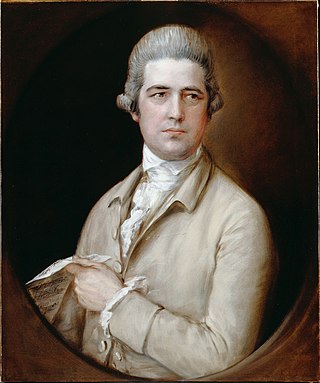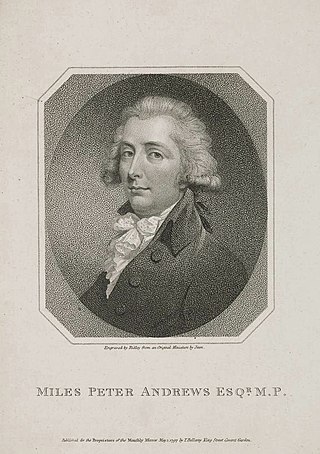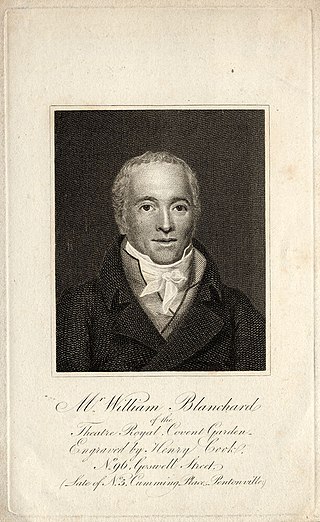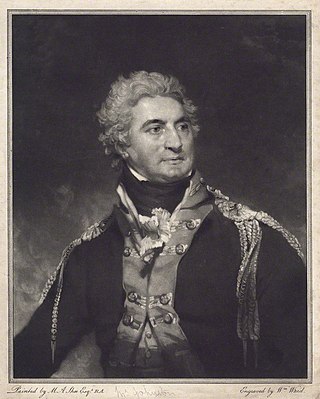Related Research Articles

Michael William Balfe was an Irish composer, best remembered for his operas, especially The Bohemian Girl.

Charles Bannister (1738–1804) was an English actor, comedian and singer.

Michael Arne was an English composer, harpsichordist, organist, singer, and actor. He was the son of the composer Thomas Arne and the soprano Cecilia Young, a member of the famous Young family of musicians of the seventeenth and eighteenth centuries. Like his father, Arne worked primarily as a composer of stage music and vocal art song, contributing little to other genres of music. He wrote several songs for London's pleasure gardens, the most famous of which is Lass with the Delicate Air (1762). A moderately prolific composer, Arne wrote nine operas and collaborated on at least 15 others. His most successful opera, Cymon (1767), enjoyed several revivals during his lifetime and into the early nineteenth century.

Charles Dibdin was an English composer, musician, dramatist, novelist, singer and actor. With over 600 songs to his name, for many of which he wrote both the lyrics and the music and performed them himself, he was in his time the most prolific English singer-songwriter. He is best known as the composer of "Tom Bowling", one of his many sea songs, which often features at the Last Night of the Proms. He also wrote about 30 dramatic pieces, including the operas The Waterman (1774) and The Quaker (1775), and several novels, memoirs and histories. His works were admired by Haydn and Beethoven.

Thomas Linley was an English bass and musician active in Bath, Somerset. Born in Badminton, Gloucestershire, Linley began his musical career after he moved to Bath at age 11 and became apprentice to the organist Thomas Chilcot. After his marriage to Mary Johnson in 1752, Linley at first supported his wife and growing family predominantly as a music teacher. As his children grew and he developed their musical talent, he drew an increasing amount of income from their concerts while also managing the assembly rooms in Bath. When the new Bath Assembly Rooms opened in 1771, Linley became musical director and continued to promote his children's careers. He was eventually able to move to London with the thousands of pounds which he had amassed from their concerts.

Sir George Alexander Macfarren was an English composer and musicologist.
Henry Reinhold, also known as Thomas Reinhold, was a German opera singer.

Miles Peter Andrews was an 18th-century English playwright, gunpowder manufacturer and politician who sat in the House of Commons from 1796 to 1814.

Edwin Ransford was an English opera singer and composer.

Edward James Loder was an English composer and conductor. His best remembered work is perhaps the 1855 opera Raymond and Agnes, though his most successful opera during his lifetime was The Night Dancers.
Isaac Pocock was an English dramatist and painter of portraits and historical subjects. He wrote melodramas, farces and light operatic comedies, many being stage adaptations of existing novels. Of his 40 or so works, the most successful was Hit and Miss (1810), a musical farce. The mariner Sir Isaac Pocock (1751–1810) was his uncle.

John Till Allingham was an English dramatist.

William Blanchard (1769–1835) was an English comedian.
Henry Condell (1757–1834), was an English violinist and composer.
William Howard Glover (1819-1875), was an English musical composer and writer.
James Cobb (1756–1818) was an English librettist. He provided texts for the opera composers such as Stephen Storace, and Lord Burghersh.

John Henry Johnstone (1749–1828), also known as 'Jack' Johnstone or 'Irish' Johnstone, was an Irish actor, comedian and singer. He was a notable performer of Stage Irishman roles.
Thomas Simpson Cooke was an Irish composer, conductor, singer, theatre musician and music director – an influential figure in early 19th-century opera in London.

Henry Phillips (1801–1876) was an English singer, who took on operatic roles in the 1820s and 1830s.
Matthew Peter King was an English composer, mainly of light operas.
References
- ↑ Opera Glass
- 1 2 3 . Dictionary of National Biography . London: Smith, Elder & Co. 1885–1900.
- Attribution
![]() This article incorporates text from a publication now in the public domain : "Welsh, Thomas". Dictionary of National Biography . London: Smith, Elder & Co. 1885–1900.
This article incorporates text from a publication now in the public domain : "Welsh, Thomas". Dictionary of National Biography . London: Smith, Elder & Co. 1885–1900.